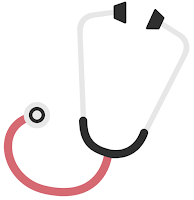Do we need a name for that thing where you take your child to the doctor but your child can't or won't talk and so you give the doctor all your observations and interpretations, and diagnoses and treatments get made based on that? Well, maybe not just on that, exactly; I'd like to believe that doctors make their own observations and can see things for themselves that we as laypeople might not necessarily know about. But it feels like we are describing our children and others are making decisions based solely on those descriptions.
It's empowering, sure, to be believed and accepted as an expert on your child. But it's also scary as hell.
Because unlike someone who is creating medical drama for a child out of some psychological need for attention, the parents I'm talking about -- well, me, specifically -- don't want to create drama. We'd like our kids to be healthy. We just want to take care of them, like any other parent. But when you have a kid who, say, doesn't feel pain like most kids, or doesn't have the kind of abstract understanding that comes in handy when articulating physical and mental and emotional health, or has language skills below what medical professionals expect and demand (leading those docs to turn their confused gazes onto you for clarification) ... what do you do?
You give your best guess, is what you do. You've been thinking about this stuff tons before that appointment. Maybe you try to coach your kid to say that thing you talked about in the car, and then maybe you just say it yourself. You hope you're right. You pray you're right. You wish you had a magic wand that, just for five minutes, would allow you to have a serious and detail-filled debriefing with your child so you'd know you're right.
And sometimes you decide to let it go, it's all in your head, you're being overprotective ... and you're wrong, wrong, wrong. Like the time I interpreted my son's vague complaints of a tummy-ache when he got home from school each day as more related to academic stress and girl trouble than any physical ailment, and it turned out to be an ulcer that would ultimately rupture and require emergency surgery. I beat myself up pretty good about missing those signs -- yet if I had brought him into the doctor earlier and claimed he was having stomach problems, and he'd been his usual inexpressive self, not answering questions or maybe denying that pain he'd already forgotten about, would the doctor have ordered tests or medication or surgery? Should a doctor act in that situation? Would even I be sure that I wasn't making all this up?
I recently had the uncomfortable experience of talking to professionals about a young person's deteriorating mental and emotional health, and the feeling that I was gaslighting the poor kid was overwhelming, even as I knew that things weren't right and crisis mode was appropriate and the afflicted one was incapable of coherent self-expression. I know so well from parenting kids with developmental differences how enormously open to interpretation behavior is, and how many different things it can mean, and how dangerous it is to assume that your interpretation is the right one. Yet my interpretation was being used to determine things like medication and hospitalization. How can that be? How can it be any other way?
It's a dilemma, and one that will continue until they invent one of those Star Trek thingies where you run a device over a person and it automatically tells you everything that's wrong. Meanwhile, the pressure will continue to be on us parents to make our guesses as educated as possible and make sure that it's not all, or in any small way, about us. Good luck with that.

1 comment:
Even the Star Trek Medical tricorder didn't tell the Dr. what was wrong, it just gave him/her a readout of your physical condition (sort of a combo. x-ray, cat scan, ultrasound, internal organ scan, etc.). It was still up to the Dr. to figure out what all the data meant. Same thing with kids; they may tell you things & you may see things and you give all that, along with your interpretations and HOPE that any diagnoses they come up with will be right (or at least close) & any medications they prescribe will be effective (or at least help somewhat). All this may be accentuated with developmentally challenged kids, but the basics are probably still the same.
Post a Comment